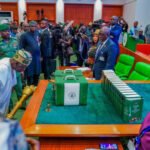The presidential candidate of Labour Party (LP), Peter Obi, has said that basic education is the ‘most critical aspect’ of education and called for improved funding of the sector in Nigeria.
The basic education sector in Nigeria is lacking the necessary funding and governmental support, with the annual monetary allocations to the sector usually less than the minimum of 15 percent recommended by the United Nations Educational, Scientific and Cultural Organisation (UNESCO).
About 18.5 million children, the majority of whom are girls, do not have access to education in Nigeria, a figure up sharply compared with 2021, according to the United Nations Children’s Emergency Fund (UNICEF).
That makes Nigeria the country with the highest number of out-of-school children in the world.
The Universal Basic Education Commission (UBEC) had also raised the alarm over the fact that 50 percent of schools in Nigeria lack basic furniture and other critical infrastructure for improved learning outcomes.
‘Our investment in education now is low and even that level that we have today are not properly deployed across the states. So we need to do more aggressively in terms of ensuring that even the little budget we have now gets properly to its destination’, Obi said in a Channels TV interview.
A 2020 baseline survey conducted by CentreLSD in Adamawa State shows that about 886,634 of Adamawa’s children were out of school, with 51 percent of girls of school-age out of school.
It is clear that the problems and the consequent impacts of such unresolved problems in the basic education sector is multifaceted and broad.
In spite of these concerns, Nigeria has yet to prioritise addressing the gaps in providing basic education for several millions of children as stipulated by the Goal-4 Target-1 of the United Nations Sustainable Development Goals (SDGs), to which the country is a signatory.
With basic education in Nigeria lacking the necessary funding and governmental support, it is no surprise that tertiary education in the country is also suffering from the same fate.
Public university lecturers in Nigeria have been on strike for five months with no end in sight. Many public universities in the country have poorly equipped laboratories, dilapidated lecture halls and hostels.
Photo source: Peter Obi






